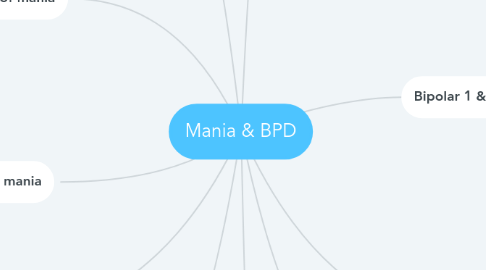
1. Hypomania & mania
1.1. Hypomania = level below complete mania
1.1.1. Severe w/ psychotic symptoms, e.g. hallucinations, delusions, thought disorder & catatonia - any or all
1.2. Same thing - varying levels of severity
1.3. Mania = psychosis
1.3.1. High mood (ecstatic, happy, angry, etc.) Irritable Overactive / over talkative
1.4. NO insight
1.4.1. Difficult to treat - not aware they're ill
1.4.2. Brought into hospital against their will
1.4.3. Generally feel fine / better than fine
2. Features of mania
2.1. High energy, never tired (hyperactive)
2.1.1. Don't want or need sleep
2.2. Speech fast & loud - can't be interrupted
2.3. Poor attention, easily distracted
2.4. "Grandiose"
2.4.1. Inflated self-esteem
2.4.2. Think they're very powerful / important
2.5. Reckless / impulsive behaviour
2.5.1. Destructive - prison, addiction or overspend in periods of mania
2.5.2. Includes suicide
2.5.2.1. Crash from high to low & act before they think
3. Psychotic features of mania
3.1. Hallucinations
3.1.1. Voices, mood congruent
3.2. Delusions
3.2.1. False beliefs, also mood congruent
4. Outcomes
4.1. Impulsivity --> destruction
4.2. Used to die from exhaustion when untreated
4.3. Hospital treatment compulsory to prevent suicide / exhaustion due to lack of insight
5. Treatment
5.1. Emergency sedation
5.1.1. BZs - lorazepam or antihistamines - promethazine
5.1.1.1. Powerful sleeping agent
5.2. Antipsychotics / neuroleptics
5.2.1. Tranquilizers - chlorpromazine
5.2.1.1. Demovtivate
5.2.1.2. Blunt emotions
5.3. ECT
5.3.1. Last resort // highly effective
6. BPD (bipolar disorder)
6.1. High prevalence, 5-10% population
6.1.1. Common psychiatric disorder
6.1.2. only 2% modern diagnoses would've been diagnosed as BPD 30 y/a
6.2. Mild severity - treated out of hospital
6.3. Diagnosis from 1 week of hospital admission
6.4. Old diagnosis
6.4.1. BPD = manic disorder
6.4.2. Prevalence was rare, only 0.1% population treated in hospital for BPD
6.5. Can be diagnosed in children / teens // manic depression = just adults
6.5.1. Children / teens can grow out of it - period of turmoil is normal
7. Bipolar 1 & Bipolar 2
7.1. Separate disorders, not varying levels of severity
7.2. Bipolar 1
7.2.1. Rare & severe
7.2.2. Equivalent to older cases of manic depression
7.3. Bipolar 2
7.3.1. More commonly diagnosed
7.3.2. 90% Bipolar diagnoses = BPD2
7.3.3. Combination of mixed diagnoses
7.3.3.1. High trait neuroticism, unstable emotions / mood swings
7.3.3.2. Major depressive disorder, high mood, energetic, talkative
7.3.4. Drug effects can cause BPD2
7.3.4.1. Side effects / withdrawal
7.3.5. Respond to sedation
8. Diagnosis
8.1. Cocktail of drugs
8.1.1. Change behaviour from destabilising the brain
9. Stephen Fry - BPD
9.1. Does cocaine (destabilises the brain)
9.2. DSM states that BPD shouldn't be diagnosed in cocaine users
10. Preventative treatment
10.1. Main treatment WAS lithium - given as carbonate ion to prevent mania
10.1.1. // side effects & difficult to find right dosage
10.2. Now given cocktail of drugs (antipsychotics) to prevent highs & lows
10.3. Anticonvulsants common
10.3.1. All major classes of psychiatric drugs taken = long-term damage
10.3.2. Must cope with side effects & interactions between drugs
10.3.3. Chase side effects not symptoms

